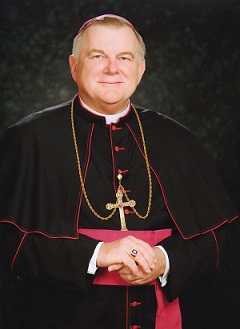What would Jesus do about Global Warming?
The road to Hell, as we all know, is paved with good intentions. The latest example is the people, many of them religious leaders, who are going to help the poor. How? They’re going to save them from global warming.
For a specific case, consider the current campaign to convince Florida Governor Rick Scott – a previously documented skeptic during the 2010 campaign – to create a plan for dealing with climate change. The campaign is led by Rev. Mitch Hescox, leader of the Evangelical Environmental Network (EEN). There’s a petition there to be delivered to Gov. Scott.
Within my own faith, there’s the US Conference of Catholic Bishops, which just released a letter to Gina McCarthy, EPA Administrator, praising the new standards on carbon dioxide emissions to be released on June 2. It’s signed by Most Reverend Thomas G. Wenski, Archbishop of Miami, who is Chairman of the Committee on Domestic Justice and Human Development. The opening paragraph goes as follows:
“I write on behalf of the United States Conference of Catholic Bishops to address the Environmental Protection Agency’s efforts to develop standards to reduce carbon pollution from existing power plants and thereby mitigate climate change. The USCCB recognizes the importance of finding means to reduce carbon pollution. These standards should protect the health and welfare of all people, especially children, the elderly, as well as poor and vulnerable communities, from harmful pollution emitted from power plants and from the impacts of climate change.”
All the dangerous Shibboleths are here – “carbon pollution”, “climate change”, “poor and vulnerable”. It goes on to say:
“As bishops and people of faith, we do not speak as experts on carbon pollution or on the technical remedies to address climate change.”
This is the archtypical Liberal good-intentions approach to public policy. One would think the Catholic bishops, having been double-crossed by Obama on healthcare and the contraception mandate, would be a little cautious in believing his extravagant claims about the havoc being wreaked on us by “severe weather.” Nope.
Or, while admitting a total lack of expertise on this scientific topic, they abjure any responsibility to learn more. Just for the record – in case this comes to Archbishop Wenski’s notice – there has been no increase in severe weather worldwide or in the US, and there’s been no global warming for 16+ years. There have been several US House Science and Technology Committee hearings on this topic; there was one just a few days ago. The four scientists who spoke all agreed the “science is unsettled” and we are unable to forecast the climate. (We can’t even forecast the weather beyond a week.)
In the very different world of faith-based ignorance, the Vatican this month hosted a conference on Sustainability. Apparently Pope Francis plans to release an Encyclical Letter on climate change to the Church in the next year. Expect the message to be:
Climate change has the greatest effect on the poor; As Christians, we have an obligation to help the poor; We can help the poor by stopping climate change.
The first two items are correct. Think of Hurricane Katrina, people who had money and/or automobiles flew or drove out of New Orleans before Katrina hit. The most terrible example was in Bangladesh in 1972, where hundreds of thousands (no, I’m NOT exaggerating) drowned in the 20 foot storm surge from a tropical cyclone.
Item two is the essence of Chapter 25:40 of Matthew’s Gospel:
“[W]hatever you have done for these, the least of my brethren, you have done for me.”
Pretty fundamental Christianity. So why am I concerned? There are two reasons.
First, anyone who thinks we humans can stop climate change by minimizing or eliminating our carbon dioxide (CO2) emissions is delusional. Recorded climate has changed throughout history, long before industrial CO2 emissions. But even if one believes CO2 is the climate control knob, China is burning more coal than the rest of the world combined (according to the New York Times), and India is following close behind. American CO2 emissions are dwarfed by Third World countries trying to raise their people out of poverty. The CEO of Peabody Coal notes coal has been the fastest-growing major fuel of the past decade and is set to surpass oil as the world’s largest fuel in coming years.
Consider the irony: pagan India and atheistic China are lifting their poor out of poverty by giving them cheap on-grid electricity. First World Christians advocate helping the poor by denying them cheap on-grid electricity, to reduce emissions.
Second, the poor are best helped by lifting them out of poverty – as China, India, and most countries of Latin America are doing. That’s history; that’s what happened in America, Europe, Canada, Australia, Japan, Iceland, Israel – the First World. With resources, especially energy, you can mitigate climate change – but not stop it.
But the World Bank won’t fund construction of coal-fired electricity generating plants in sub-Saharan Africa. Worse yet, the Catholic Climate Covenant and other interfaith environmentalists encourage colleges and universities to divest their endowments of fossil fuel assets. In April, America Magazine, a publication of the Society of Jesus (the Jesuits), carried an article titled Getting Out of Oil. This was followed by a webinar, Catholic Perspectives on Divestment and Reinvestment, led by Doug Demeo, the author of the AmericaMagazine article, and two Catholic theologians, Dr. Erin Lothes and Dr. Richard Miller. In her presentation, Dr. Lothes asks what “a world beyond fossil fuels would look like?”
I can tell Dr. Lothes what “a world beyond fossil fuels would look like” – it would look like the world of 1000 years ago, when it was being rapidly stripped of trees to burn as fuel. You can find a review of the webinar at the National Catholic Reporter.
Reading the smug assurances of Lothes, Miller, and Demeo makes me want to scream with frustration. What makes these intelligent, well-educated people so scientifically naive? I can only conclude that religious faith predisposes one to uncritical acceptance of authority, especially if it’s religious authority. Demeo, Lothes, Miller and other writers on this topic – saving the poor from global warming – accept the premise of human control of climate without demur. Sometimes a Doubting Thomas is a useful member of the congregation.
Aristotle, a pretty smart man, claimed heavier objects fall faster than lighter ones. For more than 2000 years, no one (that we know of) bothered to challenge that claim by experiment. Galileo claimed to have done so, from Pisa’s Leaning Tower. Aristotle’s logic was correct, but his assumptions were faulty. As the historian Daniel Boorstein wrote, “The opposite of knowledge is not ignorance; it’s false knowledge.”
The Scientific Method has several principles; the first is to not accept claims about natural philosophy (as it was originally called) without data, experimental results that can be verified by repetition. “The science is all settled” is an oxymoron, though I don’t include Obama and Gore in the ranks of theologians – or even honest men. The 17-year “pause” in the IPCC’s unanimously-predicted warming demonstrates the hypothesis is flawed.
Where is Galileo when we need him?



